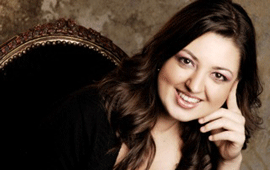> [Archived] Interviews

An Interview with the Pianist Alexandra Dariescu
During
this period you perform Concert
No.1 by Tchaikovsky and Concert
No.2 by Shostakovich. You have
also recently interpreted the preludes of the latter composer. Does
something in particular attract you to the Russian repertoire, Mrs.
Alexandra Dariescu?
Yes, it attracts me a great deal. I think that Russian music suits me best. I feel honoured to have been invited to perform together with all of these orchestras. This month will be a very busy one. I am also going to Finland for the first time where I will interpret Concert No.21 by Mozart with the local Kymi Sinfonietta and Clemens Schuldt. The two concerts by Tchaikovsky and Shostakovich are very dear to me and I cherish them greatly. I have performed them several times with different orchestras. I am very happy that I have been invited, along with the Halle Orchestra which is the oldest professional orchestra in Great Britain, to perform at the Manchester Bridgewater Hall on 22nd March. This date is very important to me because I made my debut in Great Britain on 22nd March, 2006, at the Mozart Festival that was broadcast live on BBC Radio 3.
It
is a concert included in a mini-tour in the north-eastern part of
England. Is it the first time that you will be performing there?
No. I have performed countless times in the north of England, but I will be working with the Halle Orchestra for the first time. At Bridgewater I have performed many times in recitals and concerts as well with the orchestra and different composers. But this will be my first time working with Halle. I am delighted and excited at the same time because it is an extraordinary orchestra conducted by Sir Mark Elder whom I have known for a few years now. I can hardly wait to work again with this orchestra.
Mrs. Alexandra Dariescu, you have performed with countless
English ensembles. Is there a characteristic feature that tells them
apart, or better said, that defines them?
Every orchestra is different and it is only natural that each conductor has his own style of dealing with orchestra rehearsals and of focusing on particular features and characteristics. The Halle Orchestra, which I have listened to many times and I have always watched it with great admiration, has a special sound, which was created and nurtured by Sir Barbiroli, who used to be a conductor there. Now, Sir Mark Elder is simply developing that sound, where the whole organization and the beauty of the strings can be strongly felt. It is a very keen sound, very intense, which I think will fit the Russian composers wonderfully. But, they also focus a lot on British music, especially Elgar.
Your
spring itinerary contains not only concerts, but also recitals. There
is also a series of recitals with the violinist Alexandru Tomescu
among them. How did you manage to get this collaboration?
Alexandru is a very good friend and it made me very happy to have accepted my invitation to come to London. We will perform at the Romanian Cultural Institute for the Fundatia ADEPT Transylvania. It is a British foundation with headquarters in Great Britain as well as Romania, which sponsors a charitable concert where even Prince Charles will attend. We are having this first concert together in London, in May, with beautiful compositions by Shostakovich, Chopin, Olah, Dinu Lipatti and Bartok.
Translated by Roxana Țicămucă and Elena Daniela Radu
MTTLC, The University of Bucharest














